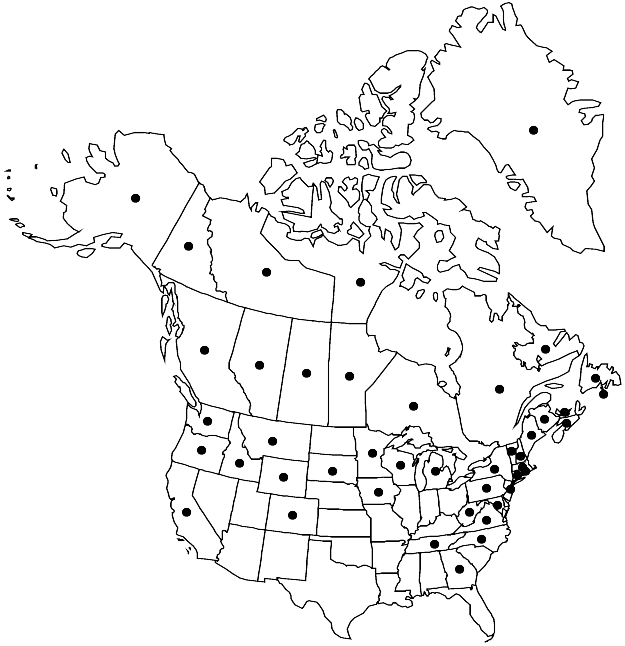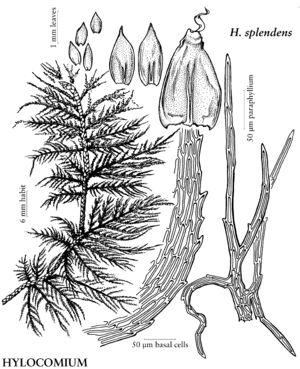Difference between revisions of "Hylocomium splendens"
in P. Bruch and W. P. Schimper, Bryol. Europ. 5: 173. 1852.
FNA>Volume Importer |
FNA>Volume Importer |
||
| Line 11: | Line 11: | ||
|label=Selected by author to be illustrated | |label=Selected by author to be illustrated | ||
}} | }} | ||
| − | |basionyms={{Treatment/ID/ | + | |basionyms={{Treatment/ID/Basionym |
|name=Hypnum splendens | |name=Hypnum splendens | ||
|authority=Hedwig | |authority=Hedwig | ||
| + | |publication_title=Sp. Musc. Frond., | ||
| + | |publication_place=262, plate 67, figs. 6 – 9. 1801 | ||
}} | }} | ||
|synonyms={{Treatment/ID/Synonym | |synonyms={{Treatment/ID/Synonym | ||
| Line 70: | Line 72: | ||
|publication year=1852 | |publication year=1852 | ||
|special status=Selected by author to be illustrated | |special status=Selected by author to be illustrated | ||
| − | |source xml=https://jpend@bitbucket.org/aafc-mbb/fna-data-curation.git/src/ | + | |source xml=https://jpend@bitbucket.org/aafc-mbb/fna-data-curation.git/src/f6b125a955440c0872999024f038d74684f65921/coarse_grained_fna_xml/V28/V28_511.xml |
|genus=Hylocomium | |genus=Hylocomium | ||
|species=Hylocomium splendens | |species=Hylocomium splendens | ||
Revision as of 19:46, 24 September 2019
Plants to 20 cm. Stems with innovations usually forming ascending series of flat, frondose tiers, fronds 20–35(–50) mm wide (1-pinnate, fronds as narrow as 8 mm in reduced arctic-alpine forms). Stem leaves 1–1.7 mm wide; acumen long, crimped (reduced forms ovate, 1–1.8 × 0.7–1 mm; apex rounded to obtuse or often abruptly acute); medial laminal cells 30–70 × 4–6 µm. Primary branch leaves erect-spreading, ovate to elliptic, concave, 0.8–1.3(–2) × 0.3–0.6(–0.9) mm; margins reflexed basally, broadly incurved near apex; apex short-acuminate, bluntly acute, or obtuse. Branchlet leaves ovate to elliptic-lanceolate, concave, 0.3–0.8 × 0.2–0.4 mm. Seta 0.5–2.5 cm. Capsule mostly bent horizontal at neck, ovoid to ellipsoid, neck distinct, 1.7–2.8 mm.
Habitat: Soil, humus, rotten logs, and rock over extensive areas of forest, especially boreal conifer forests, also common in arctic and alpine tundra
Elevation: low to high elevations (0-3700 m)
Distribution

Greenland, St. Pierre and Miquelon, Alta., B.C., Man., N.B., Nfld. and Labr., N.W.T., N.S., Nunavut, Ont., P.E.I., Que., Sask., Yukon, Alaska, Calif., Colo., Conn., Ga., Idaho, Iowa, Maine, Md., Mass., Mich., Minn., Mont., N.H., N.J., N.Y., N.C., Oreg., Pa., R.I., S.Dak., Tenn., Vt., Va., Wash., W.Va., Wis., Wyo., Eurasia, Africa, Pacific Islands (New Zealand), Australia.
Discussion
Hylocomium splendens is one of the most common and widespread mosses of the circumboreal forest and Arctic tundra, covering large areas of Canada, Alaska, northern Europe, and Siberia. Variation in nutrients and climate produces variation in size, growth pattern, and leaf morphology over this broad range. Plants from coniferous rainforests of the Pacific Northwest are robust, 3-pinnate, and form deep wefts of stair-step innovations. The stem leaves have long, crimped acumens. Plants from the Arctic tundra, however, are much smaller, only 1- or 2-pinnate, and usually lack the arching innovations. The stem leaves have obtuse or abruptly acute apices. Although these two forms are quite distinct and could easily be named as separate species, between the temperate rainforest and the Arctic tundra there exist plants of every intermediate form. It is best, therefore, to treat this continuum as a single variable species; it does not seem worthwhile to apply names to the infraspecific variants.
Selected References
None.
